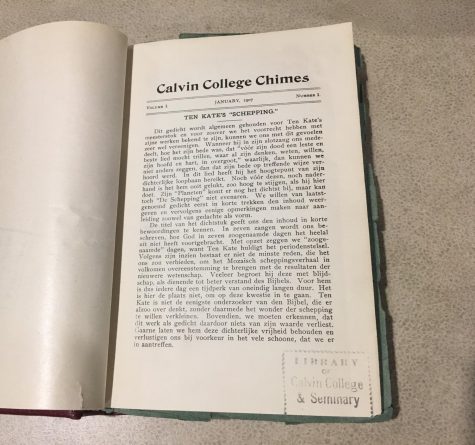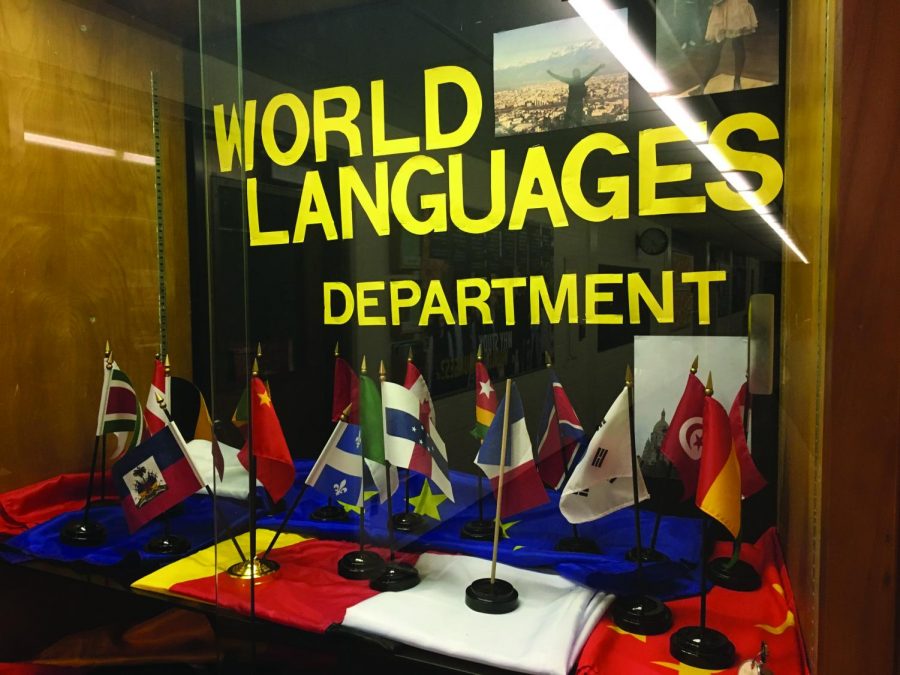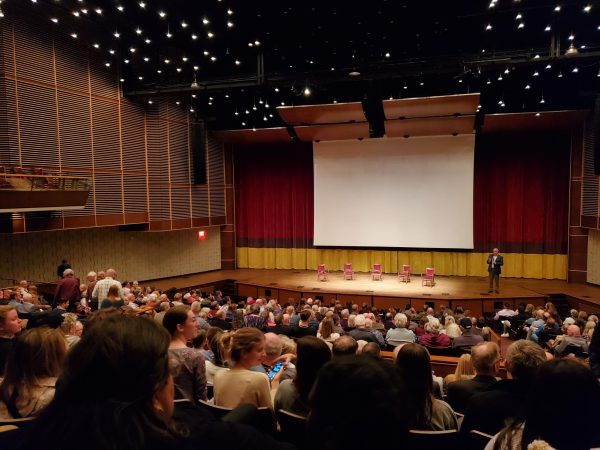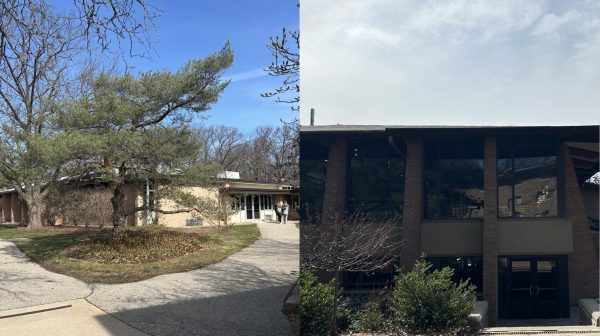Number of students studying language declines despite benefits
This article could have been written in Dutch, had it been written in 1907 when Chimes began; it is written in English, however, as many students across campus are monolingual. Despite a decline in students enrolled in foreign language classes, students speak multiple languages across campus in a variety of settings. Just sitting in the Fish House for an hour, I overheard three different languages being used, and many students use other languages in classes.
“I have friends in two of my classes who speak Spanish, so usually when we see each other we just start talking in Spanish,” senior Betsy Gomez, who is fluent in both Spanish and English, said, joking that if they forgot to do the homework, they’ll talk about it in Spanish so the professor doesn’t understand.
Retired English professor Henry Barron, who speaks four languages — German, Frisian, English and Dutch — runs a Frisian club on Calvin’s campus. The group has been meeting since 1988 and gets together to practice Frisian biweekly. Some of them are fluent in the language, while others are only curious. Barron himself spoke Frisian as his first language and immigrated from the Netherlands when he was 14.
During the meetings, the group reads from a children’s Bible, folk tales, poems and other resources.
“We try hard to use the language. That’s very difficult, actually, because it’s not anyone’s daily language,” Barron said, “so it is so easy to fall back into English.”
Calvin College offers nine language programs, and students are required to take two years of a language. However, many programs such as nursing and engineering have only a one-year requirement, and many students who took a language in high school are exempt.
Professor Barron believes it’s important for students to learn other languages. He said students who travel will “meet people who speak multiple languages and they will feel cheated, inferior.”
“I think it’s very important, very enriching. It’s too bad that it’s not really a built-in necessity, because English is a world language,” he said, “so you can get by. But that’s a temptation that you should resist.”
Sharing a language allows people to communicate on a human level, Barron said, and learning a language also means learning the history and culture of that language.
“Each language has its own persona,” he said, and speaking a new language allows your personality to reflect the language. While it’s possible to get by only speaking English, he said, it’s a temptation students should resist.
Professor Larry Herzberg of the Chinese department has certainly resisted that temptation. Currently fluent in Chinese, Japanese and English, he has studied eight languages at the college level. He intentionally only uses the language of the place he visits, and explained that when he visited countries such and France and Germany, he only spoke French and German.

A Chimes article, written in Dutch, from 1907.
“Language is a door that opens up to other cultures, other ways of being human,” Herzberg explained. Herzberg has many stories of connecting with other people through languages, such as speaking with a friend’s grandmother who only spoke Russian. Perhaps the sweetest story, though, is how he met his wife who came to Calvin College as a graduate student and at the time spoke hardly any English, and he was able to communicate with her in Chinese.
“I was the only person on campus at the time who could speak Chinese to any extent at all,” Herzberg explained. Had he only spoken English, “I wouldn’t have … fallen in love and married her,” he said. “By the grace of God, she was the right one for me.”
Speaking other languages allows students to make global connections. Herzberg pointed out how beneficial it would be for business students learning Chinese: he’s shocked at how few business students take Chinese, despite it being “the largest trading relationship between two countries in world history.” Herzberg also pointed out the beneficial partnership between the engineering and German departments as an example for other departments to follow.
But it is not just global connections students can make. In Kent County, there are 70 different languages spoken in people’s homes, according to Herzberg. He pointed to his friends and neighbors, a family from Pakistan raising their kids to be bilingual.
Despite the benefits of learning other languages, the number of college students enrolled in foreign languages is on a decline. A report by the Modern Language Association of America found that the percent of higher education students enrolled in a modern language is on a decline, with 7.6 percent in 2016, a decrease from 8.1 percent in 2013 — and less than half the amount of students enrolled in 1960.
“On the college-university level, enrollments in all language classes have gone down,” Herzberg said. “You’d think it would be incumbent on us to realize that we need to learn other languages, but it hasn’t turned out that way, and Americans still as a whole seem to feel that ‘oh, everyone should learn English.’”
Here at Calvin College, only half of students take any foreign language courses, while only 16 percent take four semesters, according to data from the 2010 graduating class. Some programs now require students take only one year of language, and many students are fulfilling their language requirements in high school. However, Herzberg explained that for the majority of high schools that feed into Calvin, four years of Chinese or Japanese is not equivalent to even one semester here at Calvin.
Despite the downward trends, there are still many students on campus who have a passion for learning languages, and it’s a diverse group learning these languages. Herzberg said that in his first-year Chinese class, ten countries are represented among the 29 students.
There are other opportunities for students to learn other languages, from online programs to learning from friends. As well as being fluent in Spanish and English, Gomez is also currently trying to learn Portuguese. She is learning Portuguese from her boyfriend, as well as practicing on Duolingo, a language-learning app.
Like Gomez, senior Heather Hartman has also started learning languages from friends. Before taking Korean classes here at Calvin, they explained, they started to learn from friends.
Baron also pointed to the online tools available for students to learn languages.
“If anyone is interested [in learning Frisian] I would like to see them,” he joked, “and then I can steer them to a program that might really be useful; it’s pretty much all computer now.”
“Once you learn a language, you also learn about another culture, another part of the world, other perspectives. I think that having only one language kind of only allows you to see one part of the very big world that we live in,” Gomez said.
Students are able to use their languages skills beyond Calvin to serve the world, Herzberg said. They allow students to make new global connections and to learn about new cultures.
“Being able to communicate across those barriers is really important,” Hartman said. “We’re all humans, we’re all made in the image of God.”












